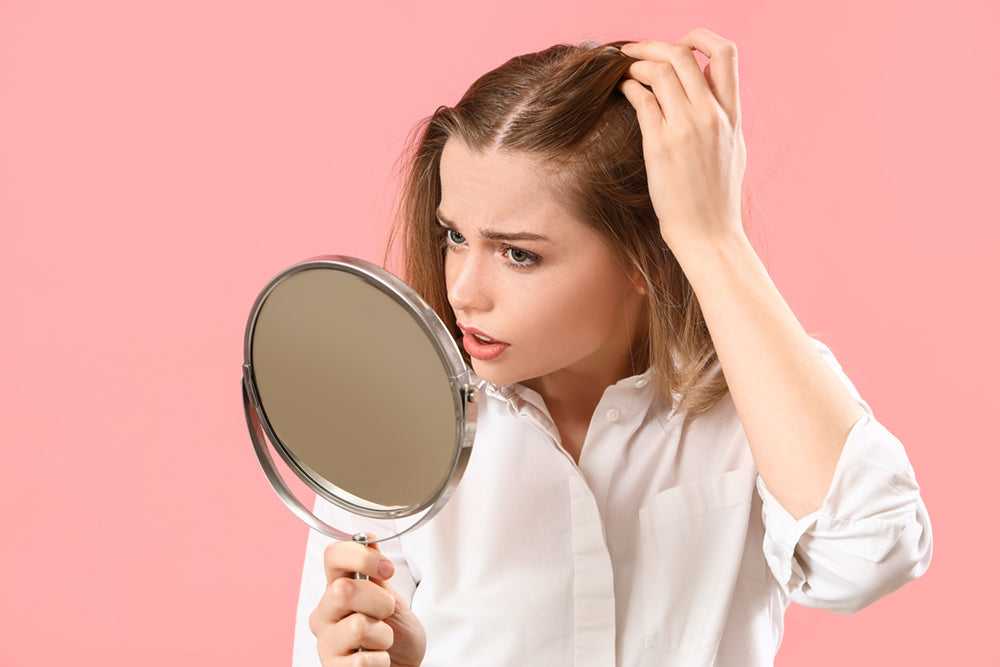
Understanding Hair Miniaturisation: Causes, Cures and Solutions
|
|
Time to read 4 min
|
|
Time to read 4 min
Hair miniaturisation is first noticeable as the hair grows thinner and thinner. It is not a process that happens overnight and often it takes a while to notice as the hair gradually grows through thinner. It occurs as the hair follicles progressively shrink, leading to thinner and weaker hair shafts.
The hair growth cycle also becomes disrupted, with shorter growing periods and longer resting periods. In men the cause is most often the onset of ‘ Male Pattern Hair Loss ’ (MPHL) or Androgenetic Alopecia which is caused by the hormone Dihydrotestosterone (DHT). Over time the hair growth becomes increasingly sparse and finer leading to visible thinning and baldness. It follows a specific pattern with receding hairline and baldness around the crown the first areas affected.
Women can also be affected by ‘ Female Pattern Hair Loss ’ (FPHL) but it is less common. Diagnosed in women by diffuse thinning across the scalp, early intervention in both cases can slow down and even halt the progression. Understanding the process of the hair growth pattern and the miniaturisation process helps immensely in finding the right treatments, products and lifestyle solutions.
I asked Charlotte Lucas , expert nutritionist who specialises in hair loss about her experience dealing with miniaturisation;
What are the root causes of hair miniaturisation?
“Men’s hair loss is often linked to genetics. The hormone DHT messes with the hair follicles leading to that familiar balding pattern. But for ladies, hormonal changes, thyroid issues, stress, diet, lifestyle and some medications can trigger this type of hair loss. Frustratingly, the mechanisms are still not as well understood in MPHL.”
When does hair miniaturisation start?
“Men’s hair loss may begin as early as late teens or early twenties, and typically FPHL reaches a first peak during the reproductive years, with a second significant peak after the menopause. As a result, FPHL is believed to be closely related to hormone ‘shifts’. Both male and female hair loss increase with age, and though hair loss in women is less frequent than in men, fewer than 50% of women have a full head of hair for their entire life”
Fine, thinning hair and hair loss can have a dramatic effect on wellbeing, affecting self-esteem and confidence. To gain further insights about the treatments, I asked Charlotte:
Can hair miniaturisation be treated?
“The burning question on many minds is can thinning and hair loss be halted or reversed? There’s a multi million dollar industry built on trying to treat it. But is it possible?
Well the answer varies depending on the type of hair loss and factors such as genetics, diet, lifestyle, and the root cause of hair loss. The greater the genetic influence the less likely you are able to influence the loss. Understanding the underlying cause is key. While there's no one-size-fits-all solution, early intervention and personalising treatment through lifestyle choices and treatments can help slow down hair loss and stimulate regrowth.”
Charlotte highlights the Importance of healthy lifestyle
“The first step is ensuring you're maintaining a healthy lifestyle with a good quality balanced diet. Nutrients status and gut health play important roles together with physical activity, sleep, relaxation and emotional connection.
The adage "you are what you eat" rings especially true in the realm of hair health. This is the most important first step. Replacing your food intake with a nutrient-rich diet brimming with good quality protein, vitamins (A, C, D, E), minerals (iron, zinc, selenium), and omega-3 fatty acids fuels the hair follicles, promoting robust growth and resilience. And focussing on gut health is essential. Aim to eat a rainbow of coloured fruits and vegetables daily,leafy greens, nuts, seeds, and fatty fish into your daily meals to fortify your hair growth.”
Charlotte, what other advice can you give?
“Emotional well-being, sleep, and physical activity all play significant roles in hair health. Chronic stress and anxiety can contribute to hair loss by disrupting the hair growth cycle and increasing cortisol levels, a hormone associated with hair thinning. Additionally, poor sleep quality or insufficient sleep can impair the body's ability to repair and regenerate hair follicles, leading to increased shedding and slower hair growth. Engaging in regular physical activity not only helps to reduce stress and improve sleep quality but also enhances immune health and blood circulation, delivering essential nutrients to the scalp and promoting hair growth. It's important to prioritise stress management techniques such as meditation, exercise, and therapy, as well as establish healthy sleep habits to support overall hair health. Addressing emotional well-being, maintaining a consistent exercise routine, and ensuring adequate rest can complement hair loss treatments and promote optimal results.”
“By incorporating scalp care into your hair care routine, you can support optimal hair growth and overall scalp health.”
The most important thing is early intervention, not by one method but by taking a holistic approach to many aspects and seeking professional advice. In summary, the best results will be a combination of the right products to externally treat scalp health, the right diet to balance nutrition and stimulate overall health, supplements to support vital nutrients and lifestyle choices that promote healthy living.
If you have any questions you would like to ask our professional advisors please comment below.
"Feel free to drop your questions or concerns as comments below and we will be happy to help you."